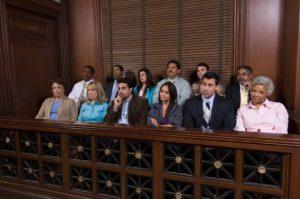 Hearsay, statements made outside the courtroom, are typically inadmissible as evidence in criminal trials. Like most laws, however, there are exceptions to the rule. Below are some of the exceptions that allow courts to accept hearsay as evidence.
Hearsay, statements made outside the courtroom, are typically inadmissible as evidence in criminal trials. Like most laws, however, there are exceptions to the rule. Below are some of the exceptions that allow courts to accept hearsay as evidence.
Present Sense Impression
Many people like to describe their experiences. For example, if you are on a bus with a broken air conditioner (AC), you might complain to the person next to you about the hot weather. In such a case, the court may allow your statement as evidence of whether or not you are available to testify.
The rationale is that you would only have commented on the hot weather if you were truly feeling hot. With that rationalization, your statement is more likely to be true.
Excited Utterance
Courts usually reject hearsay as evidence because, in most cases, they cannot verify the accuracy of hearsay. However, any statement you make under excitement or stress is likely to be true. Thus, courts typically accept such statements as evidence. Examples of excited utterances include things you might say immediately after:
- You receive good news, such as a job promotion
- You receive bad news, such as a death in the family
- You face immediate danger, for example, if someone points a gun at you
- You suffer a physical injury, such as a broken leg
The likelihood of admission of an excited utterance is high if the examination or testimony involves the event that triggered the excitement. Say you witnessed a robbery and shouted about it. If someone overheard you shouting, they could testify about it during the robber’s trial.
Statements Against Interest
Most people only lie to benefit themselves or their loved ones. Thus, if you make a statement that hurts your interests, the courts will typically believe the statement and accept it as evidence.
Consider a case where you see someone steal a piece of jewelry and narrate the theft to the thief’s parent. If the parent testifies about your narration, the court will believe them even though the narration is hearsay. After all, an average person is unlikely to lie that their child is a thief.
Medical Treatment
Most people know that they must be honest with their medical care providers. Absolute honesty is the best way to get the best medical care. Thus, if you say something to your medical providers, such as your dentist or doctor, the court may accept your statements as evidence.
Say someone heard you tell your doctor that you cut your finger at work. The court will accept the hearsay as evidence because you are unlikely to have lied to your doctor.
Public Records
Any public record is admissible as evidence, even if the person who created the record is available. Examples of public records that are admissible as evidence include:
- Income tax returns
- Marriage certificates
- Court judgments
- Birth certificates
- Property ownership records
- Market reports
The court cannot reject such evidence — that would mean the government (that created the record and of which the court is part) is dishonest.
Present State of Mind
The hearsay exception allows statements that a person makes to declare their present state of mind. For example, you describe your present state of the mind if you tell a friend that you are sad, excited, angry, or fearful. Anyone who hears your declaration can testify about them in court if there is a dispute about your state of mind at the time you uttered the declaration.
Criminal law can be complicated. Unless you are a legal professional, you need the help of an experienced defense lawyer whenever you face criminal charges. Daniels, Long & Pinsel, LLC, has the legal knowledge and experience you need for your defense. Contact us about your criminal case so that we can begin to work on your defense.